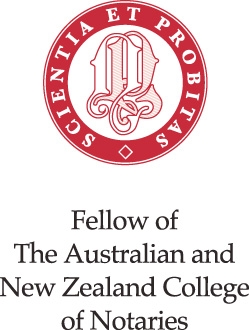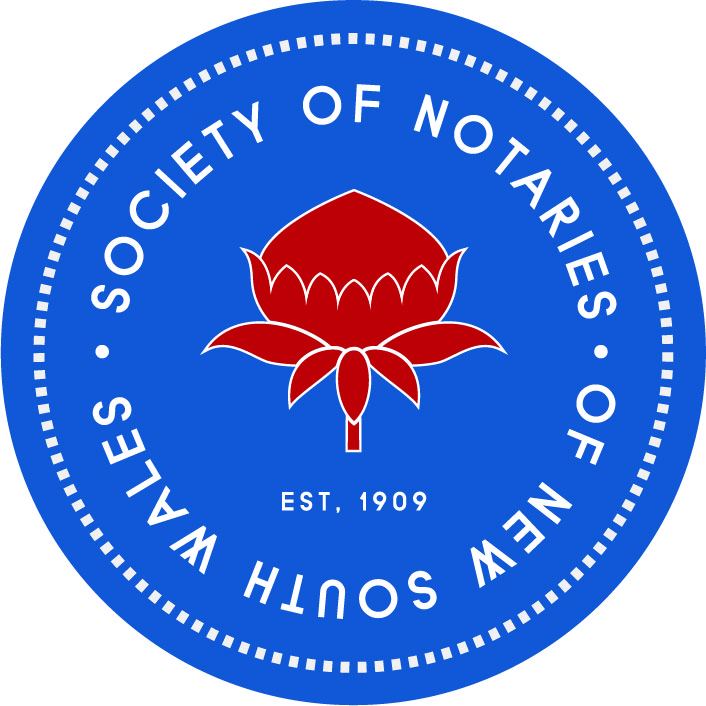Notary Public Services
For most documents to be accepted overseas, they must be legalised or formally proved valid and genuine. This requires that the document be witnessed or certified by a public notary (also known as a ‘notary public’ or ‘notary’).
In Australia, notaries are senior legal practitioners who are qualified to authenticate, prepare, attest, verify, witness and certify original and copy legal documents for use in Australia and overseas. Notaries are appointed by the Supreme Court of New South Wales pursuant to the Public Notaries Act 1997 (NSW) and the Public Notaries Appointment Rules 1998.
Once appointed, notaries are issued with an official ‘seal’ which is placed alongside or underneath their signature when signing or witnessing documents. The signatures of all notaries are stored in a database held by the Department of Foreign Affairs and Trade (DFAT).
Legalisation of the Notary’s signature
In some cases, documents to be sent overseas require the signature and seal of the notary to be legalised (certified as correct) by DFAT. Once DFAT has issued its certificate and endorsed or attached it to the notary’s document, the document may have to be certified at the Consulate or Embassy of the foreign country to which it is to be sent. It is important to confirm the requirements with the foreign receiving authority.
Many countries, including Australia, are signatories to a Convention that overcomes the double requirement of legalisation and then certification by the Consulate. Member countries issue an ‘Apostille’ which cuts time and expense for the client.
Under The Hague Convention Abolishing the Requirement of Legalisation for Foreign Public Documents of 1961, the Australian authorised affixer of the Apostille is DFAT.
The Apostille is a statement identifying the signature of the notary and comprises a large seal affixed to the notary’s signed document.
As a general rule, documents going to countries that are not party to the Hague Convention require an ‘Authentication’. Once DFAT has authenticated the document, you must take it to the relevant Consulate or Embassy before it can be sent to the intended destination country.
When might I need the services of a notary public?
The services of a notary may be required for a range of commercial transactions such as overseas trade documents (letters of credit), contractual arrangements between foreign businesses (transfers of foreign assets, property and land) and matters concerning international trademarks, copyright or patent applications.
At a personal level, you may need to have documents notarised if they are to be used overseas or have been issued from another country, for example, the certification of passports, births and deaths certificates; citizenship certificates and consent to travel documentation; wills and probate documents where overseas assets form part of an estate; powers of attorney and overseas police checks.
We can provide a range of notarial services including:
- attesting (proving) the authenticity of official, Government and personal documents and certifying their proper execution
- verifying education records, qualifications, employment and medical documents
- administering oaths / affirmations, witnessing affidavits, and taking declarations
- witnessing Powers of Attorney
- dealing with documentation for land, property and deceased estates
- For corporations and business, witnessing documents and authenticating status and transactions
- Preparing and submitting application to DFAT for Apostille or Authentication
- Arranging translation of documents by NAATI certified translators if necessary.
Attending a Notary Public
When performing their duties, notaries must verify the identity of the person signing a document or swearing an oath. The notary must also make an informed decision that the signatory is not legally incapacitated (has sufficient mental capacity) and understands the nature and effect of the document being signed and/or attested. If the signatory is acting in an official capacity (such as a director of a registered company), the notary must be satisfied that the person has authority to act.
When using the services of a notary public, signatories must bring sufficient identification documents, for example, passport, birth certificate and driver’s licence.
When making an appointment, you should provide the identification documents required as well as any other information necessary for the notary to provide his or her services. Some documents that are not in English may need to be translated before they can be processed by a notary.
We assist clients with documents to be sent all over the world. Luana Torres is an experienced Notary Public and appears on the official register maintained by DFAT, and various Consulates and Embassies recommend her notarial services.
Being the first Brazilian-born Australian lawyer to be appointed as a Notary Public by the Supreme Court of NSW, Luana is particularly familiar with documents to be presented in Portuguese and Spanish speaking countries.
Luana provides tailored notarial services and often communicates with lawyers and notaries overseas, to ensure a smooth transaction from beginning to end.
Luana is a Councillor of the Society of Notaries of NSW and often presents at their Notarial Practice Course conducted at the College of Law. She is also a Fellow of the Australian and New Zealand College of Notaries.
If you need any assistance, contact us at [email protected] or call 02 9570 7671 for expert notarial services.
For further information, please see links below.
https://www.smartraveller.gov.au/consular-services/notarial-services/documents-in-australia


